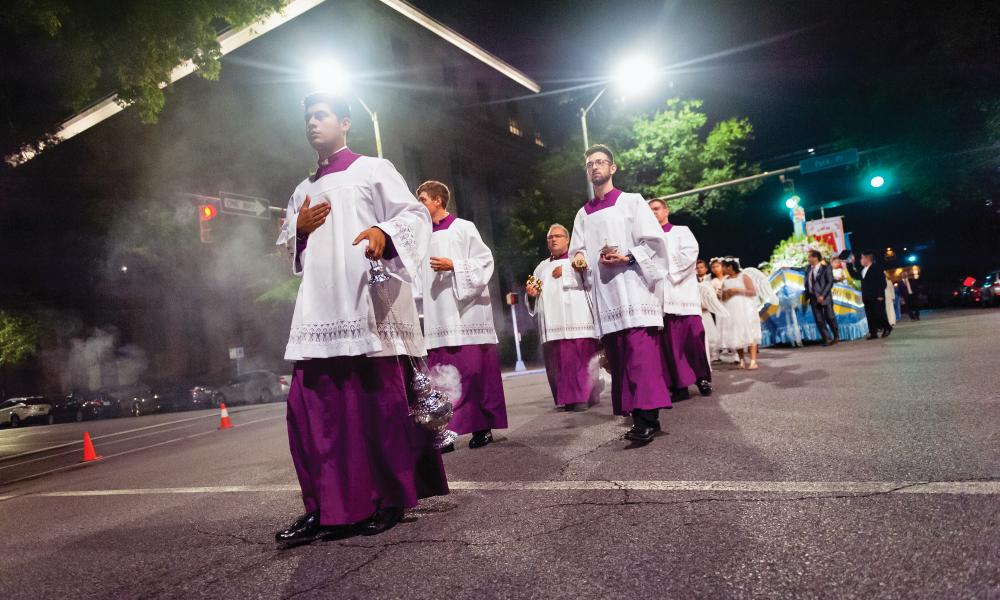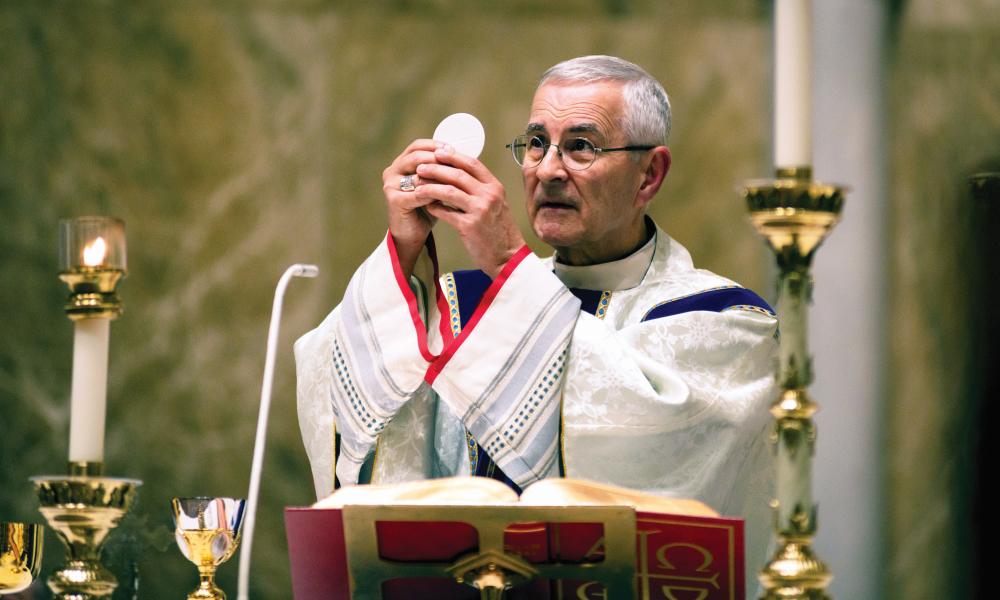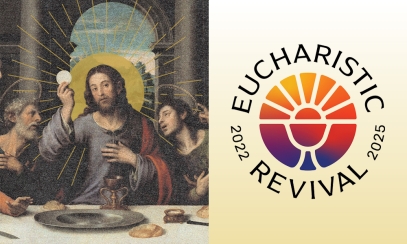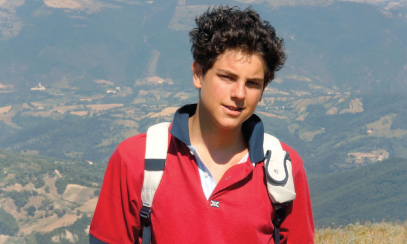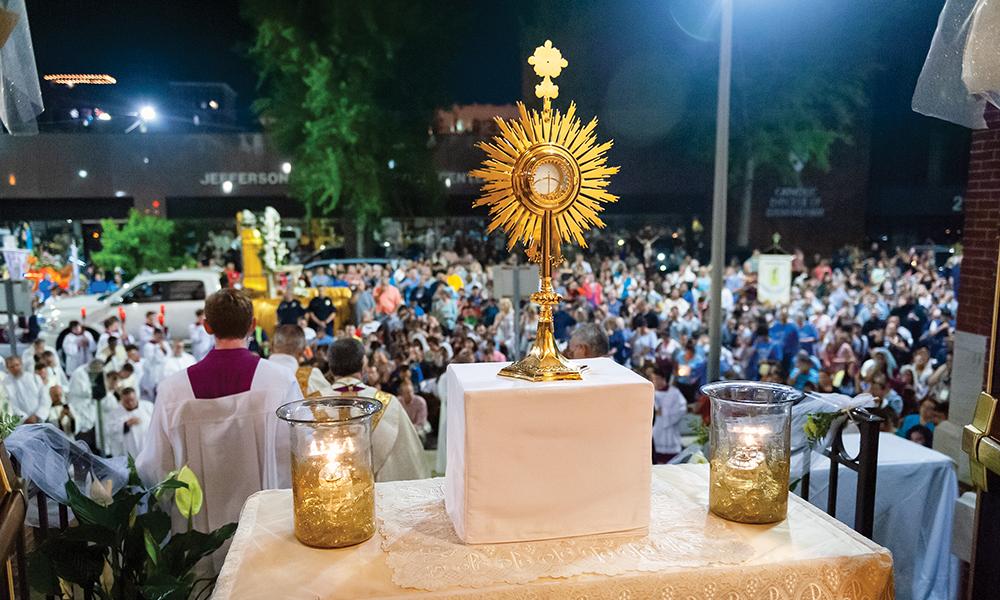
‘My Flesh for the Life of the World’
Diocese Set to Join Nation on Journey of Eucharistic Revival
Diocese Set to Join Nation on Journey of Eucharistic Revival
The bishops of the United States have called for a three-year (2022-2024) “grassroots revival of devotion and belief in the Real Presence of Jesus in the Eucharist.” It is their prayer, and indeed ours too, that there be a “movement of Catholics across the United States, healed, converted, formed, and unified by an encounter with Jesus in the Eucharist — and sent out in mission ‘for the life of the world.’ (Jn 6:51)” These three years will culminate in the National Eucharistic Congress, the first in almost 50 years. The five-day event will be held in Indianapolis, starting on Wednesday, July 17, 2024.
The bishops of the United States have called for a three-year (2022-2024) “grassroots revival of devotion and belief in the Real Presence of Jesus in the Eucharist.” It is their prayer, and indeed ours too, that there be a “movement of Catholics across the United States, healed, converted, formed, and unified by an encounter with Jesus in the Eucharist — and sent out in mission ‘for the life of the world.’ (Jn 6:51)” These three years will culminate in the National Eucharistic Congress, the first in almost 50 years. The five-day event will be held in Indianapolis, starting on Wednesday, July 17, 2024.
Locally, the diocesan-wide phases of revival will begin in the days preceding the 2022 feast of Corpus Christi with a 40 Hours Eucharistic Devotion at the cathedral, culminating in a procession of the Blessed Sacrament through downtown Birmingham at 7 p.m. on Sunday, June 19. Many will recall the great blessing the Eucharistic Congress procession was in 2019.
In this first in a series of articles to be published throughout the revival, we firstly note that among the factors that have moved the bishops of our country to call for a National Eucharistic Revival are the alarming numbers of Catholics in the United States who are not regularly attending Sunday Mass.
For centuries, the wisdom of the Church on this matter has not wavered. The precepts of the Church, to which we are all bound, are intended to provide the minimum parameters for our sacramental and moral lives. The insistence of the Church safeguards our ability to continue in our pursuit of both love of God and of our neighbor.
The Sunday Eucharist is the foundation and cornerstone of our entire lives as Christians. As Catholics, we are invited to gather in community every single week and to then participate fully in the Sunday Eucharistic celebration, which is the “source and summit of the Christian life.”
The Catechism of the Catholic Church notes that “participation in the communal celebration of the Sunday Eucharist is a testimony of belonging and of being faithful to Christ and to His Church. The faithful give witness by this to their communion in faith and charity. Together they testify to God’s holiness and their hope of salvation. They strengthen one another under the guidance of the Holy Spirit.” (2182)
The Sunday and Holy Day obligation is not something God asks of us out of His own necessity.
Our God has no intrinsic need to be worshipped. However, one of the aspects of our liturgical celebrations is to become gifts to the faithful for our own spiritual well-being, happiness, and eternal salvation. While these are certainly not the only functions of the Mass, the graces that we uniquely receive when we gather corporately for worship are nevertheless indispensable.
Last year, amidst a global pandemic, the bishops of the Church in practically every diocese around the world took the extraordinary, though not unprecedented, step of suspending public celebrations of Mass, as well as the Sunday obligation to attend Mass on the Lord’s Day. The Diocese of Birmingham, too, suspended (for a short time) public in-person Masses due to the threat of infection and a desire to do our part in slowing the spread of the virus.
During this time, it was truly inspiring to witness the exceptional creativity that our priests, deacons, and lay faithful exercised in providing for our people during this extraordinary time. The pastoral provisions illuminated that it is our faith that every single Mass has infinite value, even and especially in those most distressing times when the congregation could not be present. Every single Mass is the renewal of the true sacrifice of Calvary, offered every time for the salvation of the entire world.
As time went on, we continued to learn more about the virus and how it spread. When we resumed the public celebration of Masses, we did so with necessary precautions. A primary conviction for these steps was to not unduly prolong the return to Mass for those who were well and not medically compromised.
Thankfully, many have returned to Mass. Unfortunately, however, there are still many who have not yet returned. Perhaps, for some, watching a livestreamed Mass from the comfort of their own home has become the new Sunday morning routine. For others, an unreasonable fear of infection may be preventing them from returning when there is almost certainly more risk of exposure in other resumed daily routines.
Unless someone has a legitimate reason not to attend Sunday Mass (personal health or the health of someone they care for), they should not excuse themselves from Mass. Sunday is firstly the Lord’s Day, and, as such, should be objectively celebrated in a manner distinct from the other days of the week. The obligation to assist at Holy Mass on Sundays when we are not legitimately impeded is indeed a serious duty.
Our participation in Sunday Mass bears witness to our belonging to and being faithful to Jesus Christ and to His Holy Church. Because of the importance of the Sunday Eucharist (in terms of our duty towards God, our neighbor, and our own spiritual welfare), those who do not participate at Sunday Mass without legitimate reason should seek sacramental confession prior to their next occasion for the reception of Holy Communion.
The bishops have rightfully discerned that our secular culture has lost its sense of the sacredness of Sunday and has regrettably grown accustomed to treating Sunday as any other business day. For the Catholic, time is a very sacred element. God has hallowed time through His work of creation and redemption, and, in a sacramental sense, keeping the Lord’s Day holy concretely acknowledges this marvelous truth. It is up to us as Christians, and as Christian families who strive to be faithful to the Church’s teachings, to reclaim the special reverence due to the Lord’s Day. May our resolve to be faithful to the Sunday Mass be renewed as we embark upon the National Eucharistic Revival.
Father Justin Ward, S.T.L., is the Diocese of Birmingham’s Vicar for Sacred Liturgy, Episcopal Master of Ceremonies, and Chair of the diocesan Eucharistic Revival Planning Committee. He holds a Licentiate of Sacred Theology from the University of Saint Mary of the Lake in Illinois.

